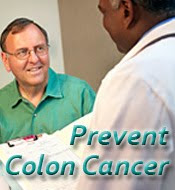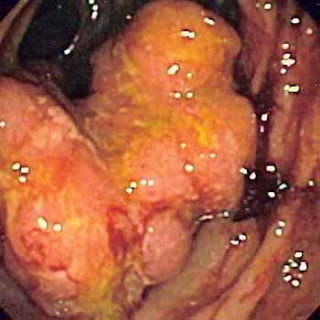Colon cancer is a serious disease characterized by abnormal cell growth in the colon, which creates a cancerous tumor. This kind of illness ranks third in the list of the most common forms of cancer and are most often prevalent in people over 50 years old, but can occur in patients of any age.

Cancers of the colon, or of the rectum, are highly treatable if they are diagnosed in the early stages of the disease. However, many people often are not diagnosed in time as early symptoms are not always recognized and, when they are, people are somewhat hesitant to discuss the details of their symptoms with a doctor.
The symptoms include:
1. Abdominal pain, bloating, or discomfort
2. Bloody stool
3. Long, thin stool (often described as pencil-like)
4. Unintended weight loss
5. Loss of appetite
6. Changes in normal bowel habits (rectal bleeding, diarrhea, constipation, or feeling an inability to completely empty the bowel).
Each year nearly 150,000 new cases of this disease are reported. There is no identifiable cause for it, but the following are some of the factors that may increase the risk of its development:
* Gender (Both men and women are equally prone to developing the malady. However, men tend to develop the rectal version at slightly higher rates, while women are more prone to the colon variety)
* Age (The sickness can be developed at any age, but the chances are increased in people over the age of 50 years old.)
* Diabetes
* Obesity
* Cigarette smoking
* Alcohol consumption
* Poor diet
* Family history
* Personal history.
People with a family history of
colorectal cancer are slightly more prone to developing it. If more than one family member has been diagnosed with the problem, the risk is even higher. Also, diets high in calories and fat, and low in fiber add to an increased risk of developing the disorder. Anyone over the age of 50 should undergo regular screening for the disorder, but anyone in any of the above risk groups should begin earlier.
Screening normally consists of an annual rectal exam, including stool samples. Some exams may require a scope to be inserted into the rectum in order to view the entire bowel. If there is cause for concern or further examination of the colon's tissue, a biopsy may be ordered for a closer analysis. If cancer is discovered, other tests, such as an ultrasound, CT scan or X-ray would be done in order to determine whether it has spread to other areas. Of particular concern is the liver as it is one of the more likely places that this dangerous disease spreads to.
Because the risk can be reduced by a high fiber diet, proper weight management (including exercise) and by not smoking, it is highly recommended that people opt for healthier lifestyles and decrease their chances of developing this type of life threatening ailment, and others, as much as possible.
Anyone who has experienced some of the previously mentioned symtoms, or who are in one of the risks groups for the disease, is advised to seek screening tests as early as possible since colorectal cancer responds very well to treatment in the earliest stages.
Ken Black is an expert online health writer and product reviewer. So, what can you do to avoid colorectal cancer? Study
Colon Cancer Symptoms and review these 10 tips on how to prevent colorectal cancer at http://www.coloncleansechoices.com/How-To-Prevent-Colon-Cancer.html
Article Source: http://EzineArticles.com/?expert=Ken_Black

 One early symptom of this type of cancer is traces of blood on the surface of or mixed in the stools. This can be easily detected with laboratory testing if not visually clear. In some cases there may be pain or tenderness in the abdomen. But in most cases there will be no symptoms of colorectal cancer until the tumor grows big enough to cause obstruction or rupture of the intestine. At this stage aggressive form of treatment like surgery have to be resorted to.
One early symptom of this type of cancer is traces of blood on the surface of or mixed in the stools. This can be easily detected with laboratory testing if not visually clear. In some cases there may be pain or tenderness in the abdomen. But in most cases there will be no symptoms of colorectal cancer until the tumor grows big enough to cause obstruction or rupture of the intestine. At this stage aggressive form of treatment like surgery have to be resorted to.
 According to updates in studies and discoveries, the numbers of victims rises rapidly for the past 30 years. Records showed that most of those afflicted sufferers were in the age range of 30-50 years old. The most visible causes of this threat were addictive smoking, aging, family history, unbalanced diet, and some problems such as history of polyps in the body.
According to updates in studies and discoveries, the numbers of victims rises rapidly for the past 30 years. Records showed that most of those afflicted sufferers were in the age range of 30-50 years old. The most visible causes of this threat were addictive smoking, aging, family history, unbalanced diet, and some problems such as history of polyps in the body.
 However, it is always better to know about those which can be detected. Mentioned below are some known symptoms of colon cancer. In case if any of the mentioned symptoms is present for more than a week, do seek advice of your physician about the screening for colon cancer.
However, it is always better to know about those which can be detected. Mentioned below are some known symptoms of colon cancer. In case if any of the mentioned symptoms is present for more than a week, do seek advice of your physician about the screening for colon cancer.


 Cancers of the colon, or of the rectum, are highly treatable if they are diagnosed in the early stages of the disease. However, many people often are not diagnosed in time as early symptoms are not always recognized and, when they are, people are somewhat hesitant to discuss the details of their symptoms with a doctor.
Cancers of the colon, or of the rectum, are highly treatable if they are diagnosed in the early stages of the disease. However, many people often are not diagnosed in time as early symptoms are not always recognized and, when they are, people are somewhat hesitant to discuss the details of their symptoms with a doctor. Therefore it is very important for us to know the signs and
Therefore it is very important for us to know the signs and 
 There are a number of screening methods available for colon cancer detection. These tests are done alone or in combination with other tests in order to distinguish colon cancer from other intestinal diseases. Hereunder is a list of these screening and detection procedures.
There are a number of screening methods available for colon cancer detection. These tests are done alone or in combination with other tests in order to distinguish colon cancer from other intestinal diseases. Hereunder is a list of these screening and detection procedures. Unlike other conditions where the symptoms are often clear and easy to identify,
Unlike other conditions where the symptoms are often clear and easy to identify,  The symptoms include pain in the abdomen, diarrhea, blood in the feces, and sometimes constipation or sometimes even blocked bowel movements. It can range from very mild, and to extremely severe. There are cases of colon cancer that are almost without symptoms until the latest stages.
The symptoms include pain in the abdomen, diarrhea, blood in the feces, and sometimes constipation or sometimes even blocked bowel movements. It can range from very mild, and to extremely severe. There are cases of colon cancer that are almost without symptoms until the latest stages. Symptoms
Symptoms Overall, the lifetime risk for developing colorectal cancer is about 5.3% or 1 in 19. Men are slightly more likely to have it than women.
Overall, the lifetime risk for developing colorectal cancer is about 5.3% or 1 in 19. Men are slightly more likely to have it than women. This study lasted about 13 years, during which time,1,444 men and 1,041 women developed colon or rectal cancer.
This study lasted about 13 years, during which time,1,444 men and 1,041 women developed colon or rectal cancer. The colon plays two important roles. It helps the body absorb various essentials such as minerals, nutrients and water and it also assists in ridding the body of waste products. Most of the large intestine is part of the colon and the latter part of the large intestine is made up of the anal canal and the rectum.
The colon plays two important roles. It helps the body absorb various essentials such as minerals, nutrients and water and it also assists in ridding the body of waste products. Most of the large intestine is part of the colon and the latter part of the large intestine is made up of the anal canal and the rectum. 1. The uncommon familial syndromes associated with predisposition to colon most cancers at an early age are now recognized to result from germline mutations. Familial adenomatous polyposis is the end result of a mutation within the APC gene, which encodes a cell adhesion protein which has also been implicated within the control of -catenin, a potent transcriptional activator. Within the tumors that subsequently produce, the remaining allele have been lost. Similarly, hereditary nonpolyposis colorectal most cancers is linked with germline mutations in DNA repair genes such as hMSH2 and hMLH1. These genes can also be affected in sporadic cancers.
1. The uncommon familial syndromes associated with predisposition to colon most cancers at an early age are now recognized to result from germline mutations. Familial adenomatous polyposis is the end result of a mutation within the APC gene, which encodes a cell adhesion protein which has also been implicated within the control of -catenin, a potent transcriptional activator. Within the tumors that subsequently produce, the remaining allele have been lost. Similarly, hereditary nonpolyposis colorectal most cancers is linked with germline mutations in DNA repair genes such as hMSH2 and hMLH1. These genes can also be affected in sporadic cancers. Learning more about the
Learning more about the  Colon cancer is also classified as large bowel cancer or colorectal cancer, which one can infer has something to deal with the rectum. In this sense, it involves the development of cancerous tissue abnormality in the colon, thereby affecting the rectum and the appendix. These tissue abnormalities are more commonly known as adenomatous polyps which frequent the inner walls of the colon and are similar in shape to that of mushrooms. As these polyps are seen as simple in the beginning, their development into malignant abnormalities is what is regarded as colon cancer. For this reason, colonoscopies are encouraged so that there can be an early detection of these polyps and can be removed before they cause more serious problems. Importantly, researchers have found that a lot of the cancers of the colon found their origin in polyps which were left to develop untreated over time.
Colon cancer is also classified as large bowel cancer or colorectal cancer, which one can infer has something to deal with the rectum. In this sense, it involves the development of cancerous tissue abnormality in the colon, thereby affecting the rectum and the appendix. These tissue abnormalities are more commonly known as adenomatous polyps which frequent the inner walls of the colon and are similar in shape to that of mushrooms. As these polyps are seen as simple in the beginning, their development into malignant abnormalities is what is regarded as colon cancer. For this reason, colonoscopies are encouraged so that there can be an early detection of these polyps and can be removed before they cause more serious problems. Importantly, researchers have found that a lot of the cancers of the colon found their origin in polyps which were left to develop untreated over time.